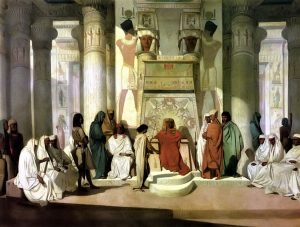Pharaoh, the king of Egypt, is frustrated. He has had two dreams — one in which he sees seven fat cows swallowed by seven skinny cows, and one in which seven fat ears of grain are swallowed by seven lean ears — and he wants to understand what they mean. He calls all his interpreters and magicians, but nobody can explain the meaning of the dreams.

Then, the chief butler speaks up and tells Pharaoh of this man he met in prison, Joseph, who interpreted his and the chief baker’s dreams exactly right. So Pharaoh sends messengers to prison, and Joseph is brought before him.
When Joseph hears the dreams, he explains to Pharaoh their meaning: There will be seven years of plenty in the land, when there will be a lot of food for everyone to eat. This will be followed by seven years of hunger when no food will grow. Joseph then advises Pharaoh to hire somebody to be in charge of storing food for the first seven years, so that there will be food to eat during the years of hunger. Pharaoh is so impressed by Joseph’s interpretation and his advice that he appoints him to be prime minister of Egypt in charge of the food in the whole country. Joseph then marries Asenat, and they have two sons: Menashe and Ephraim.
Joseph’s interpretation comes true and in the next seven years, Egypt has plenty of extra food, which Joseph puts away in special storage places he has set up. When the years of famine begin, in all the surrounding lands people are hungry, but in Egypt there is food for everyone.
Now, back in the Land of Canaan, Jacob and his sons are starving, because the famine is severe, and they don’t have food. So Jacob sends them to Egypt to buy food but keeps his youngest son Benjamin at home because he is worried for his safety. So 10 of Joseph’s brothers arrive in Egypt and go to Joseph to try to buy some grain. Joseph recognizes them immediately, but they have no idea who he is; as far as they know, they are simply speaking to the prime minister of Egypt.
Joseph accuses them of being spies, and says he will not believe that they are innocent until they bring back Benjamin. The brothers speak to each other, saying that maybe they are having these difficulties because of the way they treated their brother Joseph long ago when they sold him into slavery. They don’t realize that Joseph understands them because they speak in Hebrew. But he does, and he is so overcome that he quickly leaves the room as he bursts into tears. The brothers then go back to Canaan to get Benjamin, all except Shimon, who is put into prison by Joseph to ensure that they come back.
When they come back to Canaan, Jacob refuses to send Benjamin. He says, “It’s not enough that Joseph and Shimon are gone? You want to also take Benjamin?” But then the food runs out, and Judah promises to be responsible for Benjamin, so Jacob agrees to let them go.
This time, Joseph is very nice to them and invites them to a dinner at his palace. But then he tells one of his servants to put his special silver goblet in Benjamin’s bag. When the brothers try to leave the next morning, Joseph sends his messenger after them. The brothers are shocked that they are suspected of stealing. They say, “Why would we steal? Go ahead, search our packages; we have taken nothing.” Their bags are searched, and the goblet is found in Benjamin’s bag. The brothers are shocked and horrified.
Joseph says that as punishment for the theft, he will take Benjamin as a slave. The brothers know that they cannot return without Benjamin. What will happen now?
Copyright and reprinted with permission from Chabad.org. For more insights on the Torah portion, visit: Chabad.org/Parshah.







